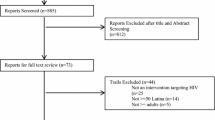Abstract
HIV/AIDS prevention campaigns have been overshadowed by conflicting, competing, and contradictory views between those who support condom use as a last resort and those who are against it for fear of promoting sexual immorality. We argue that abstinence and faithfulness to one partner are the best available moral solutions to the HIV/AIDS pandemic. Of course, deontologists may argue that condom use might appear useful and effective in controlling HIV/AIDS; however, not everything that is useful is always good. In principle, all schools of thought and faith seem to agree on the question of faithfulness for married couples and abstinence for those who are not married. But they differ on condom use. On the ground, the situation is far more complex. We simply lack a single, entirely reliable way to resolve all disagreements regarding HIV/AIDS prevention strategies.
Similar content being viewed by others
Notes
For a Christian approach, see Benedikt XVI [6, p. 10].
There are an estimated 85,000 new orphans every year out of a total population of 12 million in Malawi [17].
Even though 99% of adult men report only one sexual partner, focus group discussion suggests that there is significant under-reporting of sexual partners [10].
In contrast, see [20].
References
Jonas, Hans. 1979. The imperative of responsibility: In search of an ethics for the technological age. Chicago: University of Chicago Press.
Muula, A.S. 2006. Condom and sexual abstinence talk in the Malawi National Assembly. African Health Science 1: 21–26.
Mfutso-Bengo, Joseph M., and Terrie Taylor. 2002. Ethical jurisdictions in biomedical research. Trends in Parasitology 18 (5): 231–234.
Benagiano, G., G. Rezza, and S. Vella. 2000. Condom use for preventing the spread of HIV/AIDS: An ethical imperative. Journal of the Royal Society of Medicine 93 (9): 453–456.
Santelli, J.S., et al. 2008. Medical accuracy in sexuality education: Ideology and the scientific process. American Journal of Public Health 98 (10): 1–7.
Benedikt XVI. 2006. Enzyklika, Deus caritas est: Gott ist Liebe. Stein am Rhein: Christiana-Verlag.
Benn, Christoph, and Kenneth Boyd. 1996. Ethics, medical ethics and HIV/AIDS. The Ecumenical Review 48: 222–232.
Norr J.L., K.S. Crittenden, K.F. Norr, C.P. Kponda, D.G. Jere, and S.I. Kachingwe. 2004. Condom use and condom attitudes among adults in rural Malawi. Paper presented at the 17th International Conference on AIDS, Bangkok, Thailand.
Cohen, Desmond. 2008. Issue paper No. 27: Poverty and AIDS in Sub-Saharan Africa. http://www.undp.org/hiv/publications/issues/english/issue27e/html. Accessed 17 October 2008.
Arrehag, Lisa, Dick Durevall, Mirja Sjöblom, and Stefan de Vylder. 2006. The impact on HIV/AIDS on livelihoods, poverty and the economy of Malawi. SIDA Studies. Stockholm: Swedish International Development Cooperation Agency, 18.
Kazembe, A., C. Chipeta, U. Kafulatula, M. Kalengamaliro, and L. Kumbani. 2000. Factors that affect condom use in HIV/AIDS prevention: Evidence from focus groups in Malawi. Paper presented at the 13th International Conference on AIDS, Durban, South Africa.
Karanja, David. 2005. Catholics fighting AIDS. Catholic Insight. http://www.catholicinsight.com/online/bioethics/AIDSAfrica.shtml. Accessed 23 December 2007.
Chisi, John. 2002. AIDS and behavior. The Daily Time, Blantyre, July 24.
Marcella, Alsan. 2006. The Church and AIDS in Africa: Condoms and the culture of life. Commonwealth: A Review of Religion, Politics and Culture 133: 8.
Pope Paul VI. 1968. Encyclical Letter Humanae vitae. http://www.vatican.va/holy_father/paul_vi/encyclicals/documents/hf_p-vi_enc_25071968_humanae-vitae_en.html. Accessed 22 October 2008.
Willms, Dennis G., Maria-Ines Arratia, and Patrick Makondesa. 2004. Malawi faith communities responding to HIV/AIDS: Preliminary findings of a knowledge translation and participatory-action research (PAR) project. African Journal of AIDS Research 3 (1): 23–32.
Sharma, M. 2005. Orphan in Malawi: Prevalence, outcomes and targeting services. http://www.ifprio.org/themes/hiv/pdf/sharma2005.pdf. Accessed 17 October 2008.
Sidley, Pat. 2000. Clouding the AIDS issue. BMJ 320: 1016.
Smith, Alex Duval. 2000. AIDS Summit: Kenyan prostitutes gave scientists the key to creation of cheap AIDS vaccine. The Independent (London). http://www.independent.co.uk/life-style/health-and-wellbeing/health-news/kenyan-prostitutes-gave-scientists-the-key-to-creation-of-cheap-aids-vaccine-706775.html. Accessed 22 October 2008.
Prostitutes lose HIV immunity. 2008. BBC News. http://news.bbc.co.uk/2/hi/health/619316.stm. Accessed 17 October 2008.
Malawi Ministry of Health. 2003. Malawi national policy on HIV/AIDS, 3.2.2.6. Lilongwe.
Kasunda, Anthony. 2002. The Daily Times, Blantyre, May 24.
Author information
Authors and Affiliations
Corresponding author
Rights and permissions
About this article
Cite this article
Mfutso-Bengo, JM., Mfutso-Bengo, EM. & Masiye, F. Ethical aspects of HIV/AIDS prevention strategies and control in Malawi. Theor Med Bioeth 29, 349–356 (2008). https://doi.org/10.1007/s11017-008-9086-9
Published:
Issue Date:
DOI: https://doi.org/10.1007/s11017-008-9086-9




